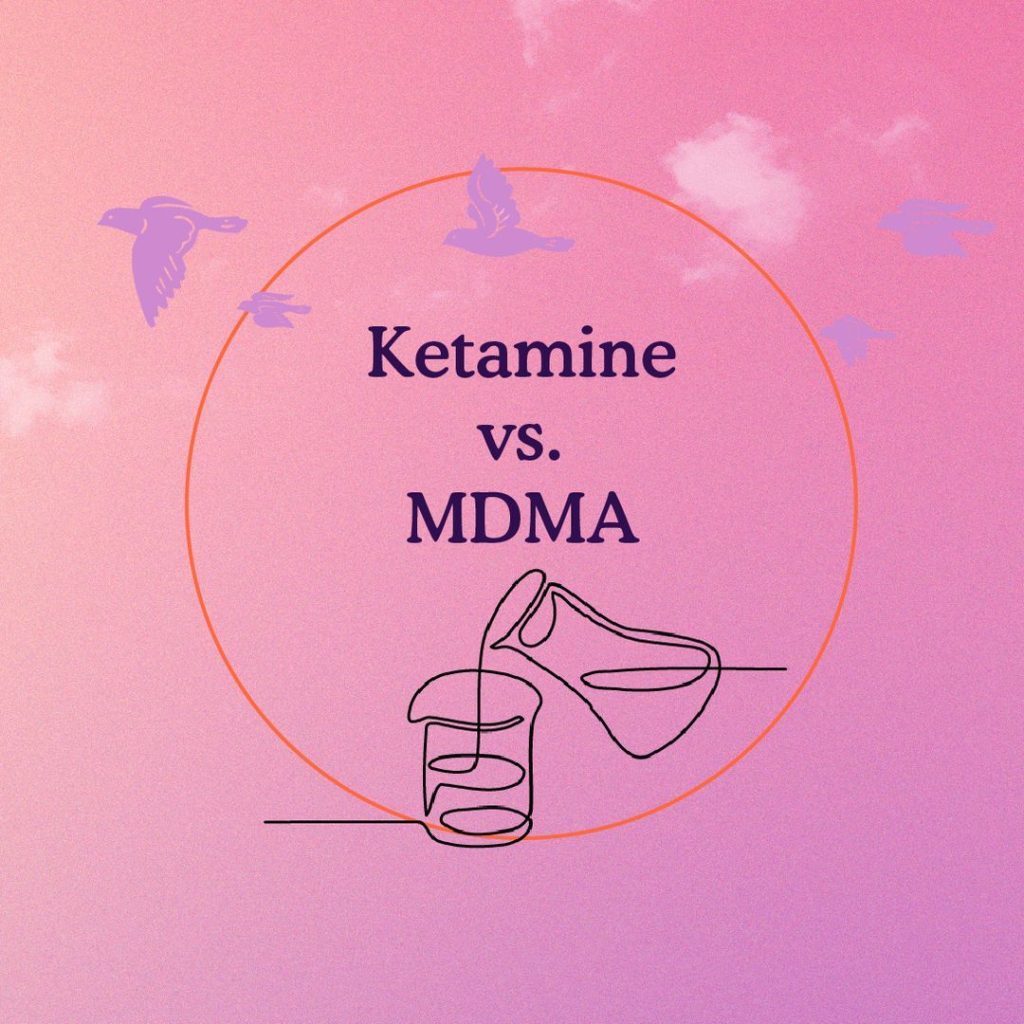
This article is for educational purposes only. MDMA remains a controlled substance in Canada and is not approved for therapeutic use outside Health Canada–authorized clinical trials. Field Trip Health does not offer MDMA-assisted psychotherapy. References to MDMA-assisted therapy describe ongoing research in regulated study settings.
From the lab to the club, from the club to the clinic and beyond, ketamine and MDMA have walked similar paths on their way to becoming two of the most widely researched and talked-about compounds in modern mental health science. Moreover, both ketamine and MDMA are considered “atypical psychedelics,” meaning they act on the brain in slightly different ways than classic psychedelics like LSD, peyote, and psilocybin.
Despite their similarities, the two are unique compounds with key differences in how they are being explored in therapeutic and research settings. Let’s explore.
How is Ketamine-Assisted Therapy different from MDMA-Assisted Therapy?
Ketamine and MDMA are fundamentally different drugs
MDMA is associated with increases in the neurotransmitters serotonin and oxytocin. When compared to classic psychedelics, however, MDMA does not seem to have as strong of an effect on specific serotonin receptors. MDMA has also been compared to the stimulant ephedrine for its similar effects on the body, specifically on smooth muscles and blood sugar. Ultimately, MDMA’s reputation for increasing emotional connection with others and inspiring action have earned it the title as an entactogenic and empathogenic compound.
Ketamine, on the other hand, was originally developed as an anesthetic in 1962. It functions mostly on GABA and glutamate levels and produces a dissociative effect in addition to its psychedelic properties. As such, many refer to ketamine as a dissociative anesthetic.
Ketamine and MDMA have separate legal histories
MDMA was originally developed by Merck laboratories in 1912. Due to initial disinterest in the compound, it was not until later that it began to be used experimentally in psychotherapy. This was unfortunately halted as various countries banned its use in the 1970s and 80s. Currently, MDMA is generally only legally accessible through Health Canada-approved research trials.
Because ketamine continues to be used in operating rooms, emergency departments, and in other settings as an anesthetic, there were no legal barriers to accessing the medicine when its mental health benefits were identified in the early 2010s.
Ketamine and MDMA are taken in different ways
Ketamine can be administered in a number of different ways such as IM injection, IV infusion, intranasally, and orally. MDMA has traditionally been consumed orally.
Ketamine- and MDMA-assisted therapies have distinct formats
Another key difference between Ketamine and MDMA in a health center is how the therapy is structured. Researchers investigating MDMA’s potential as a regulated therapeutic intervention have developed highly structured study protocols to ensure safety and consistency. These designs are comprehensive, typically involving multiple therapists and extended integration periods within approved research settings. For example, in these trials MDMA-assisted psychotherapy typically involves two therapists per client for the entirety of the client’s journey, a level of care which would likely prove quite expensive in other contexts. Furthermore, most clinical trial participants receive a total of three 8-hour MDMA sessions with nine 90-minute integration sessions.
Ketamine-assisted psychotherapy, which is legally available in Canada under appropriate medical supervision, is often delivered as a series of treatments. At our health centers, the most common approach includes six initial ketamine sessions, each lasting 2.5 hours. These sessions are designed to seamlessly integrate both the dosing and therapeutic integration into one comprehensive experience. Throughout the entire journey, a single dedicated therapist remains present, providing continuous support and guidance.
What can I expect from both Ketamine-Assisted Therapy and MDMA-Assisted therapy?
Both Ketamine and MDMA are psychedelic medicines
Ketamine and MDMA can both elicit a range of psychological experiences beyond the sensory experiences psychedelics are known for. For example, in clinical and research settings either ketamine or MDMA may lead a person to feel connected to oneself and others, warmth, an increased awareness of emotional states, the processing of trauma, and/or an altered perception in time to name a few.
Both offer potential mental health benefits
Research from six Phase 3 clinical trials showed that MDMA could provide symptom relief for those suffering from PTSD, with 54% of participants showing complete remission from the disorder by the end of the study. Similarly, a chronic PTSD study with ketamine found 67% of participants experienced a reduction in symptoms. In addition to trauma, Ketamine has also been studied as a treatment option for depression, anxiety, and suicidality among other conditions.
Like all medicines, both Ketamine and MDMA have potential side effects
Possible side effects for ketamine can include nausea, dizziness, and a headache. Prominent side effects of MDMA reported in clinical and research settings include: muscle tightness, decreased appetite, sweating, feeling cold, feeling restless, and dilated pupils. Both medicines have the potential to temporarily raise heart rate and blood pressure.
In Conclusion
Whether you are participating in an MDMA clinical trial or working with a provider offering ketamine-assisted psychotherapy in clinic, both represent emerging approaches in mental health care informed by decades of research and clinical observation. We hope you find clarity, safety, and support on your journey.
Does Field Trip Health have a ketamine therapy clinic near me?
Field Trip Health has clinics across Canada in Toronto, Montreal, Vancouver, Ottawa, Hamilton, Kitchener-Waterloo, Thunder Bay, and Sault Ste. Marie, and an at-home program for those who live more than an hour from the nearest clinic. If you are ready to begin exploring approved mental health treatment options and build your personalized treatment plan, then book a free discovery call with one of our team members.